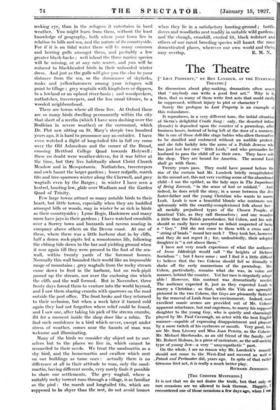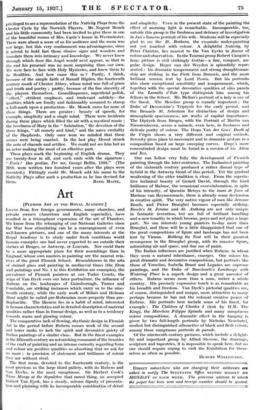[Tlih CHESTER MYSTERIES.]
IT is not that we do not desire the truth, but that only on rare occasions, are we allowed to look thereon. Happily, I encountered one of those occasions a few days ago, when I was
privileged to see a representation of the Nativity Plays from the Chester Cycle by the Norwich Players. Mr. Nugent Monck and his little community had been invited to give these in one of the beautiful rooms of Mrs. Caroe's house in Westminster. There were about a score of us kir audience and the room was not large, but this very confinement was advantageous, since it served to hold, fast those elusive signs and wonders and translate them into intimacy and knowledge. We never knew through which door the-Angel would next appear, so that in the end his presence was no more surprising than our own. We were face.to face with Holy Mysteries, and knew them to be Realities. And how came this so ? Partly, I think, because of the simple faith of Ranulf Higden, the fourteenth century monk of Chester Abbey, whose mind was full of grace and truth and poetry ; partly, because of the fine sincerity of the players themselves. Grandiloquence, superficial polish, ‘- effect," strident emphasis, and irrelevant subtlety—the qualities which are fondly and fashionably assumed to stamp a hall-mark upon a production—Mr. Monck cares for none of these things. There are greater : beauty of speech, for example, simplicity and a single mind. There were incidents during these plays which filled the air with a mystical music ; the loveliness of Mary in the " Salutation," the devotion of the three Kings, " all comely and kind," and the naive credulity of the Shepherds. Only once were we minded that these scenes were being enacted. In the last play Herod struck the note of charade and artifice. We could not see him but as an actor making the most of an effective part.
These plays mark the beginning of English drama. They are twenty-four in all, and each ends with the signature : "Finis ! Deo gratias, Per me, Georgi Benin, 1592." (The MSS. were written two hundred years after the plays were invented.) Fittingly could Mr. Monck add his name to the Nativity Plays after such a production as he has devised for



































 Previous page
Previous page